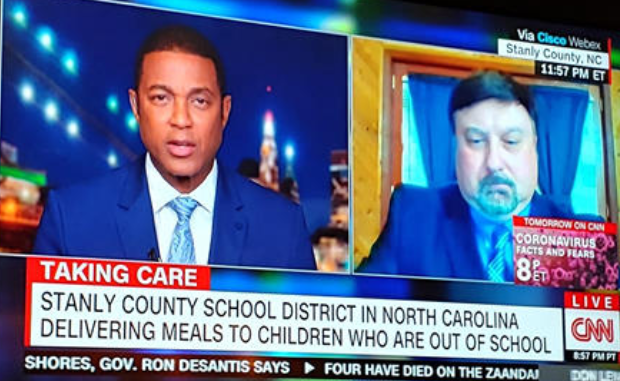
ALBEMARLE — On Don Lemon’s April 1 show on CNN, Stanly County residents may have noticed a familiar face, that of school Superintendent Dr. Jeff James. CNN reached out to James for an interview after hearing about the innovative use of school buses to deliver food to students who have been sent home due to the COVID-19 pandemic.
“We have approximately 8,400 students in our district,” James told Lemon. “About 62% are free and reduced lunch. The first week, we served 45,000 meals, and we followed up the second week with 43,000.”
James told SCJ that initially he did not want to do the CNN interview, but now, after more than 32,000 likes on Facebook, he thinks it turned out well. James said his wife told him that after Lemon’s first question, he never let the CNN host “get another word in.”
Ironically, the same day SCS was receiving national attention on their use of school buses to deliver food, they also halted the use of buses in their program. This move came after an order from the state that said they were violating the 10-person limit for gatherings.
“It actually takes, to put out the 10,000 meals a day, about 400 people at 8 sites. So that’s 50 people per site,” James said on what led to the call from Raleigh.
After some phone calls and negotiations, SCS then received word from the governor’s office that the 10-person limit did not apply to essential workers — so bus drivers, cafeteria workers and other school employees could continue to prepare the meals. But going out and mingling with the “non-essential” workers, students and parents would not be allowed by the state.
The new “game plan,” as James called it, would be to prepare the food at four schools, bus it to eight others and then have the students come to those 12 locations to pick up the meals. This has led to fewer meals being distributed than when they were using the bus routes.
“Right now we have 12 sites, and we’re hoping after Spring Break, if the virus has plateaued or dropped in the number of cases, that we can possibly go back and expand to all of our schools being a pickup site,” James said. “And as things continue to improve, if necessary, we can go back to doing bus routes. We’re doing about 5,000 [meals] right now, and we were doing 10,200 a day. Our goal is to get back to that while preserving the safety of our employees.”
Some districts have given up on providing food to students after regulatory issues, or, in Durham County’s case, after a worker tested positive for COVID-19. James said he wants, “if at all possible, not to stop meals,” saying, “These kids depend on this food.”
During Spring Break, SCS will not be providing food to students, and James said there are some businesses and other community groups he is hoping will pick up the slack.
Some people in the community that he said are stepping up are Commissioner Tommy Jordan, who has provided supplies like face masks and hand sanitizer; Highway 55 and other restaurants, who are providing low or no cost meals for students; and his school employees, like Tina Carter, a teacher at North Stanly High School who is using her 3-D printer to make face shields to be used by those preparing student meals and by local health care workers.
Carter told SCJ that it takes her three-and-a-half hours to make each face shield, and that she starts at 7 a.m. each morning and finishes at midnight.
“I took my 3-D printer home from school, so I’ve just been kind of printing non-stop,” Carter said. “It’s kind of a non-stop operation the whole day and night.”
She uses her dining room table as her work station, and, while she says she won’t be mass-producing the shields, her 3-D printer is “a little workhorse,” and has been cranking out shields for those who need them in Stanly County.
When school does start back again, Carter says it will be a good teaching lesson for her drafting students. “I’ll say, look, this is how we used drafting, design and 3-D printing. This is exactly why you design. So it’s helping me and the kids out too.”
